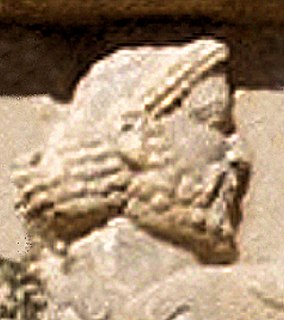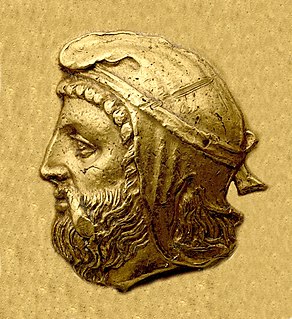
Xerxes I, called Xerxes the Great, was the fifth king of kings of the Achaemenid dynasty of Persia. Like his father and predecessor Darius I, he ruled the empire at its territorial apex. He ruled from 486 BC until his assassination in 465 BC at the hands of Artabanus, the commander of the royal bodyguard.
This article concerns the period 469 BC – 460 BC.
Year 484 BC was a year of the pre-Julian Roman calendar. At the time, it was known as the Year of the Consulship of Mamercus and Vibulanus. The denomination 484 BC for this year has been used since the early medieval period, when the Anno Domini calendar era became the prevalent method in Europe for naming years.
Year 460 BC was a year of the pre-Julian Roman calendar. At the time, it was known as the Year of the Consulship of Poplicola and Sabinus. The denomination 460 BC for this year has been used since the early medieval period, when the Anno Domini calendar era became the prevalent method in Europe for naming years.

Mausolus was a ruler of Caria, nominally a satrap of the Achaemenid Empire. He enjoyed the status of king or dynast by virtue of the powerful position created by his father Hecatomnus who had succeeded the assassinated Persian Satrap Tissaphernes in the Carian satrapy and founded the hereditary dynasty of the Hecatomnids.

Artabazos was a Persian general in the army of Xerxes I, and later satrap of Hellespontine Phrygia under the Achaemenid dynasty, founder of the Pharnacid dynasty of satraps. He was the son of Pharnaces, who was the younger brother of Hystaspes, father of Darius I. Artabazos was therefore a first cousin of the great Achaemenid ruler Darius I.
The Twenty-eighth Dynasty of Egypt is usually classified as the third dynasty of the Ancient Egyptian Late Period. The 28th Dynasty lasted from 404 BC to 398 BC and it includes only one Pharaoh, Amyrtaeus (Amenirdis), also known as Psamtik V or Psammetichus V. Amyrtaeus was probably the grandson of the Amyrtaeus of Sais, who is known to have carried on a rebellion in 465–463 BC with the Libyan chief, Inarus, against the satrap Achaemenes of Achaemenid Egypt.

Balakros, also Balacrus, the son of Nicanor, one of Alexander the Great's "Somatophylakes" (bodyguards), was appointed satrap of Cilicia after the Battle of Issus, 333 BC. He succeeded to the last Achaemenid satrap of Cilicia, Arsames.
The Orontid dynasty, also known by their native name Eruandid or Yervanduni, was a hereditary Armenian dynasty and the rulers of the successor state to the Iron Age kingdom of Urartu (Ararat). The Orontids established their supremacy over Armenia around the time of the Scythian and Median invasion in the 6th century BC.

Tiribazus, Tiribazos or Teribazus was a Persian general and Persian satrap of Western Armenia and later satrap of Lydia in western Anatolia.

Inaros (II), also known as Inarus, was an Egyptian rebel ruler who was the son of a Libyan prince named Psamtik, presumably of the old Saite line, and grandson of Psamtik III. In 460 BC, he revolted against the Persians with the help of his Athenian allies under Admiral Charitimides, and defeated the Persian army commanded by satrap Achaemenes in 460 BCE. The Persians retreated to Memphis, but the Athenians were finally defeated in 454 BC by the Persian army led by Megabyzus, satrap of Syria, and Artabazus, satrap of Phrygia, after a two-year siege. Inaros was captured and carried away to Susa where he was reportedly crucified in 454 BC.
Ptolemaeus was of Armenian descent. Initially satrap of Commagene, he became the first King of Commagene in 163 BC. He was of Orontid Armenian descent, being related to the king of Sophene Arsames I. His father was King Orontes IV of Armenia, son of Arsames I.

Mazaeus, Mazday or Mazaios (Greek:Μαζαῖος) was a Persian noble and satrap of Cilicia and later satrap of Babylon for the Achaemenid Empire, a satrapy which he retained under Alexander the Great.

The Twenty-seventh Dynasty of Egypt, also known as the First Egyptian Satrapy was effectively a province (satrapy) of the Achaemenid Persian Empire between 525 BC and 404 BC. It was founded by Cambyses II, the King of Persia, after his conquest of Egypt and subsequent crowning as Pharaoh of Egypt, and was disestablished upon the rebellion and crowning of Amyrtaeus as Pharaoh. A second period of Achaemenid rule in Egypt occurred under the Thirty-first Dynasty of Egypt.

Arsames was an Achaemenid satrap of ancient Egypt during the 5th century BC, at the time of the 27th Dynasty of Egypt.

Hystaspes, Vishtaspa or Gustasp, was a Persian satrap of Bactria and Persis. He was the father of Darius I, king of the Achaemenid Empire, and Artabanus, who was a trusted advisor to both his brother Darius as well as Darius's son and successor, Xerxes I.

Orontes I or Yervand I was an Armenian ruler of the Orontid Dynasty who ruled as satrap of the Achaemenid Empire between 401 BC – 344 BC. The Persian version of the name is Auruand which meant "Great Warrior" in the Avestan language. It is likely this was a special title given by the Persian king, though this seems to have become a hereditary title in that family.

Pherendates was an Achaemenid satrap of ancient Egypt during the 5th century BCE, at the time of the Achaemenid 27th Dynasty of Egypt.












